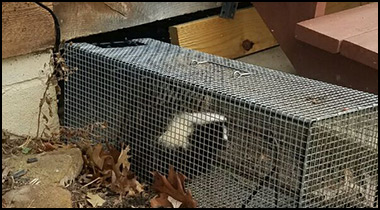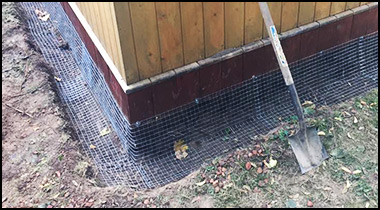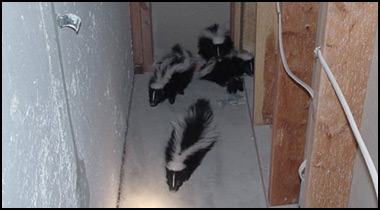Salt Lake City Skunk Removal Resources
Skunk Rehabber - Wildlife Rehabilitation Center of Northern Utah: (801) 814-7888
Free Salt Lake County Animal Services: 801-559-1100
Humane Wildlife Trappers of Salt Lake City: 801-438-6043
If you need skunk control in Salt Lake City, you have a few options. First, you can attempt to solve the skunk problem yourself by reading our do-it-yourself guide. If you need outside help, you can also call Salt Lake County Animal Services to see if they have any free resources or help for you - however, they primarily deal with dog and cat concerns. You can also call a local Salt Lake City wildlife rehabber, as they are typically a great resource for advice that is in the best welfare of the animal. If as a last resort you must hire a professional company, we recommend Humane Wildlife Trappers of Salt Lake City at 801-438-6043. To learn more about them or check their skunk removal prices, visit saltlakecitypestanimal.com.

Salt Lake City Skunk Trapping and Removal

Preventative Repairs & Exclusion

Salt Lake City Skunk Removal From Structures
In many cases, preventative measures can solve your Salt Lake City skunk problem - keep garbage secured, pet food indoors, and most of all when it comes to skunks, secure the perimeter of your shed, porch, deck, or house with a barrier - lattice or steel mesh is good, and it keeps Utah skunks from going under the structure. If trapping and removal of the skunk is the only option you have, please do so with the help of a local agency or professional company who knows how to do it humanely and legally. Browse the resources of this site for more educational information.
Frequently Asked Questions:
Prevention: How to Keep Skunks Away
What to do with a skunk after I catch it?
Is it legal for me to trap a skunk?
How to remove skunk odor
Is a skunk active during the daytime rabid?
What does skunk feces look like?
Salt Lake City Skunk Control Information: Why Do Skunks Spray?
Spraying for the skunk is a line of defense. Prior to actually spraying a skunk will give a series of warning tactics. These tactics include making noises, jumping up and down and even thumping their feet.
Generally the skunks are a timid animal and are more afraid of you than you of them. Another reason for the skunk's hesitancy to spray is the limited amount of spray that they have to use. A skunk also sprays during the breeding process. It is often how a homeowner may learn that they have a skunk living under their porch.
N-butyl commonly known as skunk spray is produced within two sacs. These sacs are located within the anus. Glands produce a urine type substance that is quite oily and is stored within the sacs. Though the N-butyl on its own smells quite bad, the smell is worsened by water.
Skunks do have natural predators, there aren't many but they are predators nonetheless. The predators are generally attack from the air or from underground. What makes these particular carnivores capable of attacking the skunk is the fact that they are completely impervious to the spray.
Predators that attack from the air are protected from the spray due to their areal attack. The Red Tail Hawk and the Great Horned Owl. Not only are these impervious the skunk spray but also are protected by the aerial approach.
There are ground predators such as a cougars, red foxes and even dogs will go after a skunk, and however they are far more hesitant than those that attack from above. Ground predators are not impervious to the spray. As a result they will only go after a skunk due to the inability to find any other food.
In fending off ground predators the skunk may have to spray on several occasions thereby running out of their supply of spray. Fortunately the skunk does not rely only on the spray; the sharpened teeth and their claws are also used to fend off the attacker. The skunk when put in the position is a worthy fighter. The predator may not always win the battle despite the size of the skunk.
The few reasons that skunk sprays are strictly for protection. They unlike other types of animals do not mark their territory with their spray.
It is no wonder why the loner skunk does not have to worry about being confronted by predators
Remember, for free services you can try (801) 814-7888 or 801-559-1100, but if you need to pay for professional help, check the prices at the saltlakecitypestanimal.com website. Or follow our do-it-yourself guide!

